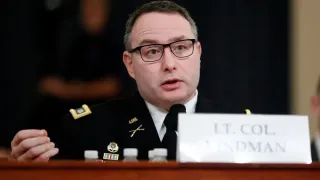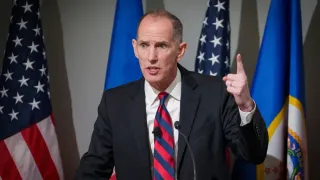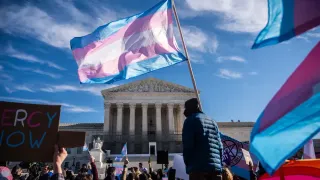
3 hours ago
Trump's About-Face in Minnesota After Pretti's Death Is Latest in Pattern of Sudden Shifts
Aamer Madhani and Steve Karnowski READ TIME: 5 MIN.
President Donald Trump shifted toward a more conciliatory approach with Democratic leaders in Minnesota on Monday, a sudden change in tack following an outcry over the second fatal shooting by federal agents in the state this month during the administration's nationwide crackdown on undocumented immigrants.
The about-face comes after Saturday’s shooting death of Alex Pretti by federal agents raised doubts — including from some Republicans — over how the Trump administration has gone about aggressively deporting migrants and confronting protesters opposed to the policy.
But it's just the latest in a string of moments where Trump has first taken a maximalist position only to appear to later retreat.
Earlier this month, Trump repeatedly threatened Iran with military action if his administration found the Islamic Republic was using deadly force to squelch recent antigovernment protests. Human rights groups said thousands were killed, but Trump says he’s holding off on acting after he received assurances Tehran was suspending hundreds of planned executions.
Last week, Trump first announced plans to impose new tariffs on European allies that refused to go along with his calls for the U.S. to take control of the Arctic territory of Greenland — only to abruptly cancel the tariffs after saying he’d come to terms of the “framework” of an agreement. The White House offered scant details about the deal, which Trump announced the day after the stock market saw one of its worst days in months in response to his tariff threat.
Then on Monday, Trump's administration changed up oversight of his immigration operation in Minnesota, and the typically bombastic Trump offered a warmer tone toward Gov. Tim Walz after speaking with the Democrat, saying he and Walz were now on a “similar wavelength.”
It was a particularly jarring turnabout for Trump, who had promised to be uncompromising on carrying out mass deportations of undocumented migrants during his 2024 campaign — and because Trump has repeatedly scorched Walz and other Minnesota Democrats in personal terms for resisting his policies.
Trump said he had dispatched border czar Tom Homan to take charge. Meanwhile, senior Border Patrol commander Greg Bovino and some agents were expected to leave Minneapolis as early as Tuesday, according to a person familiar with the matter.
Trump declared on social media that Walz “was happy that Tom Homan was going to Minnesota, and so am I!” Later, Minneapolis Mayor Jacob Frey confirmed that some agents would be leaving the city after he spoke with Trump — and suggested that the president seemed to be coming to the conclusion that the current state of federal operations was unsustainable. Homan and Frey were expected to meet Tuesday.
Trump's change-up in Minnesota came after some Republicans questioned federal agents' tactics in Saturday's shooting as well as the White House's response. Some high-ranking administration officials had branded Pretti a domestic terrorist even as videos of the encounter contradicted their narrative.
Minnesota gubernatorial candidate Chris Madel, a Minneapolis attorney, ended his GOP campaign in a surprise video announcement Monday, calling the recent immigration enforcement operation in the Twin Cities an “unmitigated disaster” and saying he no longer wanted to be a member of the party because of it.
Meanwhile, Texas Republican Gov. Greg Abbott, who has been a strong supporter of Trump’s crackdown on immigration, offered measured criticism in an interview with conservative radio host Mark Davis, saying the White House needs to “recalibrate” what it was doing in Minnesota. Vermont's Republican Gov. Phil Scott called on Trump to reset and de-escalate.
“At best, these federal immigration operations are a complete failure of coordination of acceptable public safety and law enforcement practices training, and leadership,” Scott said. “At worst, it’s a deliberate federal intimidation and incitement of American citizens that’s resulting in the murder of Americans.”
The president's approach toward Walz, who served as Democratic presidential nominee Kamala Harris' running mate in 2024, amounted to a sharp U-turn.
Just a day earlier, Trump’s deputy chief of staff, Stephen Miller, had derided Walz on social media as trying to “incite attacks on" U.S. Immigration and Customs Enforcement agents. The White House social media team in a series of posts called the governor “a truly disturbed, unstable individual” and an “unhinged lunatic” who “rants and raves and lies.”
Miller also referred to Pretti, a nurse who worked at a Veterans Affairs hospital, as a “would-be assassin” while Homeland Security Kristi Noem labeled the ICU nurse as committing an act of domestic terrorism.
The White House sidestepped whether Trump agreed with his senior aides' rhetoric or whether the administration would apologize for it.
“This incident remains under investigation,” press secretary Karoline Leavitt told reporters. “And nobody here at the White House, including the president of the United States, wants to see Americans hurt or killed and losing their lives.”
Trump’s response to the deaths of the two U.S. citizens in Minneapolis has been much more muted than reactions to political violence that he's portrayed as targeting his own political movement.
After conservative activist Charlie Kirk was assassinated in September, the president spoke to the nation from the Oval Office and called Kirk’s death “a dark moment for America.”
In November, Trump gave a national address after two National Guard members were shot in Washington by an Afghan national, one fatally. The guard members had been deployed to the nation's capital as part of a federal mission to assist with local policing, and the president called the shooting “an act of evil, an act of hatred and an act of terror.”
But the president has yet to speak directly to the nation about the deaths of Pretti and Renee Good, another U.S. citizen who was killed by federal agents in Minneapolis earlier this month. Trump has so far largely chosen to keep the public informed in the wake of Pretti’s death with social media posts.
Even as his comments Monday appeared to be aimed at turning down the rhetoric, Trump's chief spokesperson, Leavitt, continued to blame Walz and other Minnesota Democrats for encouraging “left-wing agitators to stop, record, confront and obstruct federal officers who are just trying to lawfully perform their duties.”
“This is precisely what unfolded in Minneapolis on Saturday morning,” Leavitt added.






